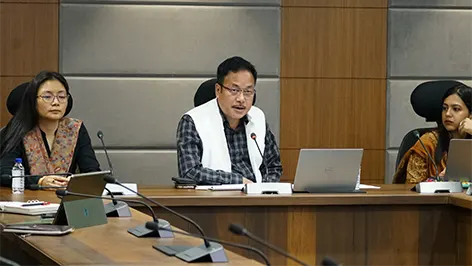ITANAGAR, 7 Apr: Agriculture Minister Gabriel D Wangsu presented a comprehensive strategy for agricultural and horticultural development in Northeast India during a High-Level Task Force (HLTF) meeting held virtually on Monday.
The HLTF on Agriculture and Horticulture, formed in January 2025, following decisions made at the 72nd plenary of the North Eastern Council in December 2024, brought together key regional leaders, including Sikkim Chief Minister Prem Singh Tamang as convener and union DoNER Minister Jyotiraditya Scindia.
Wangsu, representing Arunachal Pradesh as a member of the task force, emphasised the need for a region-specific approach to agricultural development. “A Northeast-centric dialogue and way forward must be designed out of today’s deliberation,” said Wangsu, highlighting the region’s unique social, demographic, and climatic characteristics.
The minister identified several critical challenges facing the Northeast’s agricultural sector, including low marketable volume, infrastructure gaps in processing and storage, weak market linkages, and technical knowledge deficits. These factors contribute to significant post-harvest losses and limited market access for farmers.
Wangsu proposed focusing on high-value crops such as oranges, pineapples, persimmon, kiwi, large cardamom, turmeric, ginger, Khamti rice, and buckwheat, which, he noted, offer excellent domestic and international market potential. He advocated creating specific agricultural clusters across the Northeast to generate substantial marketable volume.
A key recommendation from the minister was the establishment of a “Northeast-centric cold chain mechanism,” rather than state-specific approaches. “Cold chain infrastructure cannot be a standalone or state-specific subject,” Wangsu said.
He also called for continued support for the Mission Organic Value Chain Development for the Northeast region, describing it as “one of the most successful central sector schemes” that could be a “game changer” for the future. However, he expressed concern over the scheme’s current implementation under Krishi Unnati, which he said has resulted in lower fund utilisation.
Looking toward international markets, Wangsu proposed creating a “Northeast export promotion council,” aimed at positioning regional products in the ASEAN and SAARC markets. He urged implementation of the Krishi Udan scheme and establishing APEDA-accredited export pack houses at various airports across the Northeast.
Other recommendations included integrating markets with the National Agriculture Market (e-NAM), promoting agro-tourism, establishing a Northeast region market hub in Delhi, and increasing involvement of self-help groups and farmer producer organizations.
The task force is expected to sit for another physical meeting scheduled as a follow-up to deepen the discussions and finalise the roadmap.

